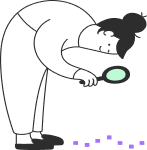Eggs are a staple food in many households and are a go-to in almost all baking recipes. They are nutritious, delicious and versatile, but there’s often confusion around one topic: are eggs dairy? After all, you find them in the dairy aisle at the grocery store. And diagrams with food groups almost always lump eggs in with the milk, yoghurt, and cheese. So are eggs considered a dairy product or not?
In short, the answer is no. But the reasons why are a little bit more complicated. Let’s take a look at the world of dairy products.

Why are eggs not considered dairy?
It’s true that we typically tend to lump them together, but eggs are not considered dairy products. That’s because the term “dairy” is usually associated with products made from the milk of mammals, such as cows, goats, or sheep. Dairy products include milk, cheese, yogurt, and butter, among others.
Eggs, on the other hand, are produced by female birds, such as chickens or ducks. They’re not made from the milk of mammals. That means they can’t be dairy products. So what are they?
Don’t lose your grocery list with a free Samsung Food Account

Eggs are classified as poultry products, not dairy products. Poultry products include chicken, duck, and turkey eggs, while dairy products are made from the milk of mammals.
Eggs are considered to be a separate food group, distinct from dairy products. So why are they always together in the grocery store and on food diagrams? Truth is, it’s probably for a couple of main reasons. Years ago, eggs used to be delivered alongside milk and we tend to associate them with one another even now. Secondly, eggs do better when they’re kept cold – and the dairy aisle tends to have plenty of refrigeration.
If they aren’t dairy, are they meat?
While eggs are not considered dairy, they are also not considered to be meat. We do consider them to be poultry products, but that isn’t the same as meat. That’s why vegetarians can eat them, but vegans can’t as they are still animal byproducts.
What’s the difference? Meat is the flesh of an animal. In this case, it would be something like chicken breast or chicken thighs. Eggs, though from chickens, are not the flesh of an animal. They are still an animal source of protein and thus a complete protein, but aren’t actually meat. Phew, confusing!
Dairy allergies vs egg allergies
It’s important to note that some people may be allergic to eggs. But this is totally different from a dairy allergy. A dairy allergy refers to an allergic reaction to the proteins found in the milk of mammals, not to eggs. Although we associate eggs with dairy, they contain absolutely no lactose. So if you’re lactose intolerant or allergic to dairy, that doesn’t mean you’re also allergic to eggs.
Of course you could be allergic to both, but they would still be two separate allergies.

Are eggs a dairy product?
So you can see that in reality, eggs are not considered dairy products. They are classified as poultry products and are a separate food group from dairy. We do keep them together and often even mix them together when we eat – think of milk and scrambled eggs, cake with butter and milk, or even cheesy eggs. But they’re not in the same food group and aren’t similar at all.
So next time you’re at the grocery store or are reading a list of allergens on a nutritional label, keep this in mind. Remember, we only really associate them strongly because of tradition and because we often cook with them together. But they don’t need to be lumped together in terms of food groups.
Discover Samsung Food user top recipe categories




